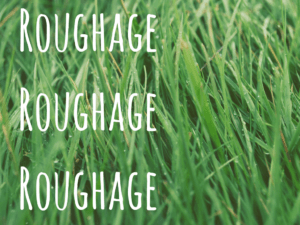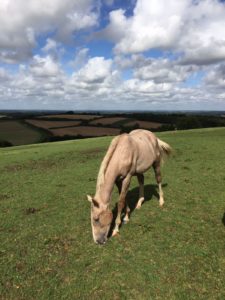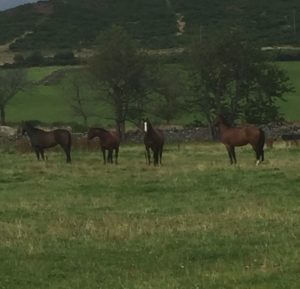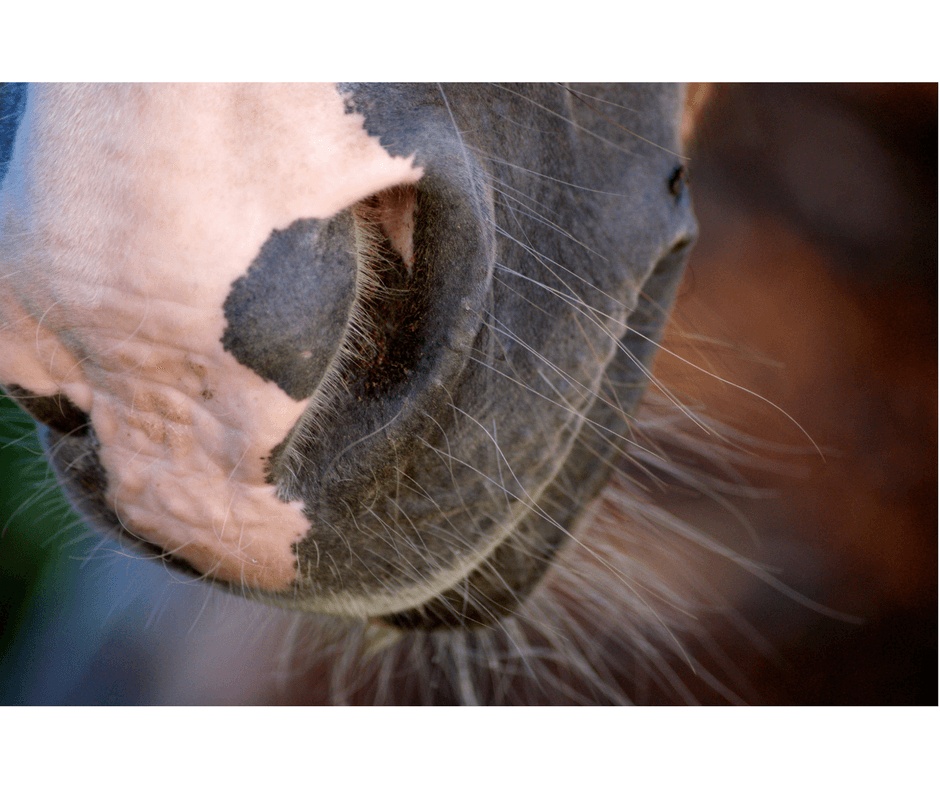1. Maximise Pasture by rotating and strip grazing.
Look at dividing your paddocks, particularly if you have large paddocks. If you have a small amount of land, like I do, you can still divide your paddocks by creating different sections and closing them off when they are over eaten. A clever idea, is to allow access to a walking track and a quiet, resting area to that horses move and then rest in places that aren’t full of grass. With small properties make sure you pick up your manure and don’t harrow. Removing the manure regularly will allow the ground to recover more quickly.
2. Slow down! Try a slow feed net/bin to reduce wastage and increase hay life.
If you are lucky enough to have access to round bales invest in a slow hay feeding net which you can secure safely over the round bale, this not only slows your horse’s chewing down but also lowers wastage. If you don’t have access to a round bale then invest in large hay nets with small holes, or a slow feed bin. This is particularly useful for those managing easy keepers as you can use Lucerne and not have them eat it all before it touches the ground!
3. Do horses naturally seek out nutrients that they require for their health and well-being?
Some horses eat dirt or chew bark, this is quite common in domesticated horses and the licking of dirt for example is often a way to increase salt intake. In some studies, types of dirt contain higher levels of iron and copper it is thought that horses seek out this type of dirt and will lick the dirt to uptake these nutrients. We don’t really know why horses tend to lick dirt or chew bark but it does appear that horses behave this way if perhaps their diet is nutrient deficient. I believe the best way to eliminate this type of practice in horses is to ensure that horses have an appropriate level of roughage always. We don’t have a good understanding of the horse’s ability to self-medicate however.
4. Position your food on the ground.
Remember horses are grazing animals and it is very important to place feed bins and hay feeders either on the ground or low down. Locating feeders up to chest height or even higher interferes with the normal digestive process. Placing feeders high does not allow the horse to chew and grind his feed normally. If the horse is not digesting its feed properly, they are also not going to be utilising it properly.

5. Roughage, roughage, roughage!
Horses require a high level of roughage (pasture, hay) per day to ensure a healthy digestive system. This can be predominantly pasture hay and some Lucerne, which has the advantage of being low in starch and sugars. Starving your horse of roughage can cause any number of issues, the worst being ulcers or colic. Particularly those on sandy soils, ensuring your horse has adequate roughage is vital for digestive, and overall health.
6. Does increasing the intake of grain impact on horses prone to colic?
Colic is associated with abdominal pain and there are many causes. The gastrointestinal tract is very long and very complex and really is not a particularly superior design. Certain types of feed can contribute to colic, overfeeding grain is one of them. One of the most important aspects of managing digestive health which in turn relates to colic incidences is lack of pasture or excellent quality hay. What may also impact on the horse’s digestive health and in turn colic is a decreased intake of water, so therefore it is very important to ensure that horses have plenty of fresh water available to them 24/7. It is not possible to point the finger specifically at grain being a cause of colic as there are many risk factors. One of the most common causes of colic is insufficient roughage, so ensuring that your horse is receiving an appropriate level of roughage will also reduce the risk of colic and other digestive health issues. The hindgut of the horse is unique and contains a bio system of microorganisms which break down fibre, the small intestines generally digests and absorbs sugar and starch. If a horse consumes a large feed that contains an elevated level of grain this can certainly create issues by spilling over into the hindgut. Microbial breakdown of starch and sugar can produce a more acidic situation this is also known as hindgut acidosis.
7. Feeding a hot brand mash and has been mentioned in the past that this could help to prevent colic particularly in winter?
A brand mash fed in winter will not prevent colic. There are many different suggestions to help with the horse’s nutritional needs that are quite preposterous. Nutrition can be complicated by incorrect advice and a lack of understanding in the management of horses in general.
8. Overfeeding protein and does this increase the energy level in horses?
Protein really should not have this type of effect on horses as it primarily contains amino acids and doesn’t contribute much to energy production. Sugars and starch can affect behaviour in some horses. But increasing carbohydrate intake is very likely to influence behaviour in horses that are genetically predisposed. By increasing sugars and starch cortisol levels may also increase this can certainly cause behavioural changes.

9. Horse owners concerned about the possibility of choke in horses
this is an oesophageal obstruction, basically almost any type of feed can cause choke this is generally related to horses that eat their feed to quickly and do not chew the feed efficiently. By ensuring that your horse has sufficient roughage and dental health checks will reduce the risk of choke.
10. Which grain is the best grain to feed your horse?
Corn for example is used a lot with elevated level performance horses but unlike oats cannot be fed whole as the outer husk is too hard so therefore some type of processing must take place to enable it to be fed safely. Corn is quite calorie dense and has an average starch concentration of about 70% so certainly is very suitable for these types of horses. My preference is always whole oats as I love the fact that horses can be fed this grain whole safely. It is also a grain that is much lower in energy and protein than any other grain and more readily digestive and utilised by the horse.
11. Giving horses water straight after a hard workout is not recommended.
It is important to allow the horse to cool down, lower the heart rate and respiratory rate and ensure that the body temperature returns to normal. It is also important to keep the muscles moving after intense exercise. Not allowing the horse to call down increases the risk of dehydration and in turn can cause some colic like symptoms.

12. Supplementation for Weight machines to build your own gym where to buy testosterone online 10 variations of lunges to spice up your weight training sessions. maximisation.
Feeding a daily supplement will pay for itself in the long run by making sure your horses receive the correct daily nutrient intake with a balanced diet. A daily supplement plays a supporting role to your horses feed program. Make sure you access a trusted source and products that deliver, are safe, natural and easy to feed and offer support and advice so you can choose the right product for your horse.
13. Choosing your feeds.
A simple non-complicated diet is essential for the health of your horse. Feeding longer chop chaffs, some grains such as oats or even steamed and rolled barley, mixing your own or using a high fibre, high quality compressed pellet, is not only healthy but economical too. Feeds, such as steamed and compressed long stem fibre pellets are a great option as they slow the chewing process down and this is a great thing for digestion.
14. Talk to a qualified nutritionist.
If you want to gain the most out of your feed rations and ensure you are not doubling up or feeding the wrong feed to your horse, contacting a qualified nutritionist is essential. Many offer free advice, and even better, a diet plan to assist in managing horses through all conditions, on all budgets. Equine nutritionists only want to see your horse looking healthy and to ensure you aren’t spending money you needn’t be.
Written by Antoinette Foster Dip. Nut. Equine Nutritional Therapist, Medical Herbalist, Nutritional Therapist Genetics © 2017



